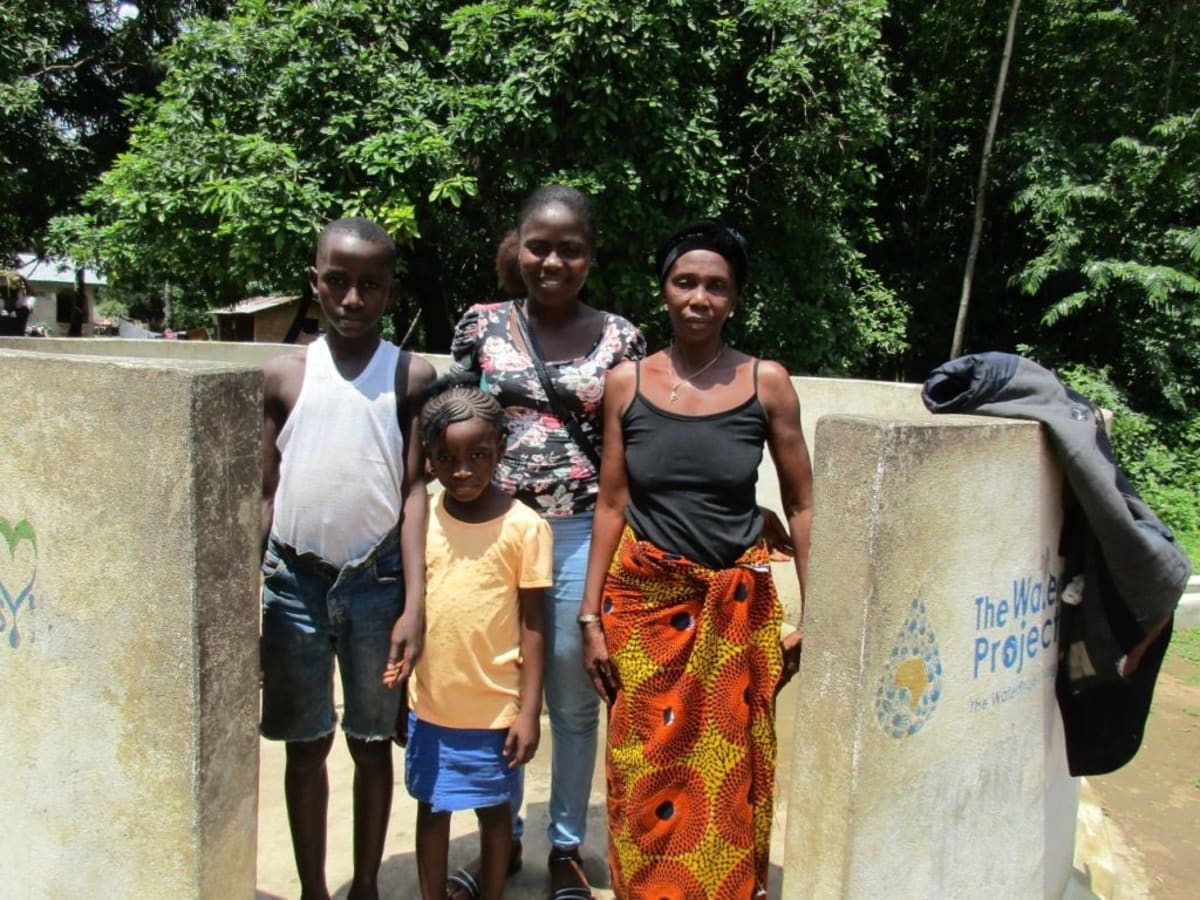Ebola’s Impact
Ebola has been a tragic reality for the people of Sierra Leone over the last two years. Though considered stable at the moment, the country is still very cautious.
Our teams have remained safe and are on the front lines of Ebola prevention through this water, hygiene and sanitation program. Your support acknowledges and celebrates their selfless work and bravery.
The entire team continues to express their gratitude for your support of communities in Sierra Leone, and we can’t wait to celebrate safe water together!
Please enjoy the following report comes straight from the field, edited for clarity and readability:
Welcome to the Community
A normal day in Katelleh Village starts very early. This community depends on two types of farming, swamp and dry land farming. Most of the men have more than one wife, and some as many as four, the maximum allowed by the Islamic Law. I spoke with one man about having more than one wife, and he responded by saying the work on his farm is too much for just one woman. Older brides are left home as nannies, taking of the children and domestic work around the house. When the adults go to the farm to work, the children go with them with a slingshot in hand, ready to drive birds away from the crops.
The best part of farming is that food here is fresh, eaten on the same day it's harvested. Life here is more enjoyable during the dry season. The rainy season is for planting, and the dry season is for harvesting.
There are 206 people from 12 different households living in Katelleh Village.
Water Situation
Women and children are those responsible for fetching their families' water. The only source of water they have is a swamp nearby. When there, they wade knee-deep into the swamp to dunk and fill their containers. Most of these are big rubber buckets. When the swamp water is delivered home, it is separated between open containers and covered containers. The covered containers are reserved for drinking.
The only good thing about the swamp's water is how cool it is. It's refreshing after spending the day in the hot sun! But the water here is certainly contaminated. After drinking, stomachs are bloated, skin rashes up, and people complain of typhoid, cholera, and diarrhea on a daily basis. The swamp is also full of leeches. When standing in the water, one is always sure to maintain a quick march to prevent those leeches from attaching.
Sanitation Situation
Under a quarter of households have a pit latrine. Most of these are pits eight to 10 feet deep with a board suspended over the top. Sticks are poked in the ground and palm leaves or tarps are stretched around them to make walls. A piece of cloth is hung at the entrance for minimal privacy. When a family's latrine fills up, they dig a new one. It is normal for locals to plant mango or coconut trees around the old latrine, but never vegetables.
Not many homes have bathing rooms, either. Some of the ones we found were missing walls. Nor are there many helpful tools like dish racks or clotheslines to safely dry belongings. We were able to find one hand-washing station in the entire village, and have included the picture in the "See Photos & Video" section.
We met Fatmata Kargbo when making house calls. She shared, "I am a 52-year-old widow. My husband died a few years ago and I have decided not to remarry. It is a small village, but people have been dying and I don't know for sure it's the water, but I know it plays a part. The health situation is bad!"
Plans: Hygiene and Sanitation Training
Training will be offered to the community for three days. At least one representative of each household is required to attend. The facilitator will use the PHAST (Participatory Hygiene and Sanitation Training) method to teach participants how to make their own hand-washing stations, wash hands, construct proper latrines, and many other topics. By the end of training, each household that participated will have their own hand-washing station. The training will also prepare a water user committee that will oversee and maintain the new well.
Plans: New Well
The vehicle that normally supplies the water needed for wet rotary drilling will not be able to make it over the makeshift bridge in the area. Instead, the community has agreed to fetch and carry all of the water needed. They will also lend helping hands and overnight security for our equipment throughout the process.
The well site is in the center of Katelleh Village. It is far from all latrines and the old cemetery. This makes it the most convenient and safest location for drilling a clean water source.
During our initial visit to Katelleh Village, we met Mohamed Fofanah, a 48-year-old farmer. He told us, "I am proud to say I was born and raised in this village. We are very skeptical about people that come to our community and promise us the world and then never deliver. We have had people from the government and other organizations, usually months before elections. After receiving our votes, they forget about us. We outnumber the educated people in this country and our voices should be heard! If you are coming here to save me, my children and my brothers and sisters, you are welcome in this village."

 Borehole Well and Hand Pump
Borehole Well and Hand Pump
 Rehabilitation Project
Rehabilitation Project






















